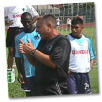Training to Your Strengths
Training to your strengths is certainly not a new idea but in many ways it runs contrary to the way most coaches think. There is something about coaches and coaching that lead us to do the opposite, train the weaknesses. It is so typical to hear a coach talk about what if. What if so and so had a better kick, was stronger or could just handle running heats? I propose that before you focus on what the athlete cannot do find out everything they can do. What are their strengths? How do they use their strengths? How is their training structured? Is an inordinate amount of time being given to training to improve weaknesses to the exclusion of the strengths? If this is the case, mentally the athlete begins to focus on their weaknesses to the exclusion of their strengths.
With the young developing athlete, ask the obvious question: Are they in the correct event, position or even the correct sport? Instead of spending an inordinate amount of time working on a perceived weakness see if the athlete is better suited for something else. Sometimes what is perceived as a weakness in one event will be strength in another. Find the talent that suits the event; do not try to make someone they are not.
Know yourself and know your athlete. Recognize the patterns that are strong and build on those. Just as you should not be defined by the competition, the athlete should not be defined by their weaknesses. Focus on weakness makes a fallacious assumption
1) that anyone can become competent in most anything
2) The greatest room for growth and improvement comes in the persons weak areas
Each athlete’s strengths are unique and personal. The more that we as coaches can help the athlete explore their strengths the more sold they will be on the training. They will see progress and then begin to factor in work on strengths that can be systematically addressed.
Do not focus on strength to the exclusion of working on the weakness, rather learn to manage the weakness. To begin to deal with the weakness first identify it. Is it something that is holding you back from being significantly better? One approach is to let your strengths overwhelm your weakness.
Is it really your weaknesses that are defeating or are you not completely exploiting your strengths. To do this you must start by being acutely aware of your strengths. To really be a strength the athlete must be able to do it consistently. This is not to say ignore your weaknesses. Work around the weaknesses to enable you to use your strengths more wisely. Make sure the weakness does not undermine the strength. Do not take your strengths for granted, learn them, and appreciate them. What is standing in the way of using your strengths?


2 Comments:
I coach triathletes, so I'm curious about what you think about strengths and weaknesses in a multisport event.
This is a really interesting post. Tricky stuff. The first thing that came to my mind is "I wonder what percent you should focus on strengths and what percent on weaknesses?" But then I suppose that is going to be different for every individual. I wonder how this breaks down in terms of technical skills versus purely athletic skills. It would seem to me that you could more readily improve technical skills than athletic ones...for example, the percentage that you could make a soccer player a better ball handler is greater than the percentage you could improve his sprinting speed.
Post a Comment
<< Home